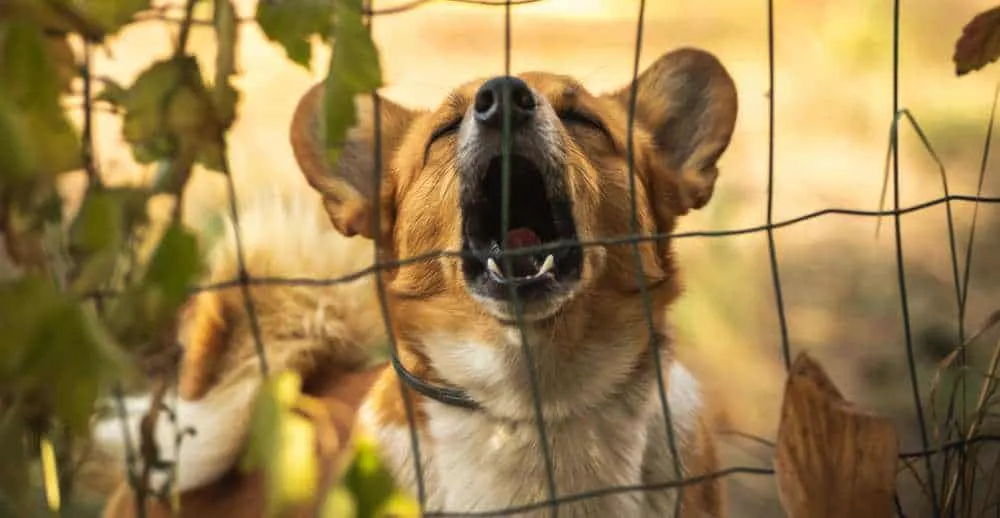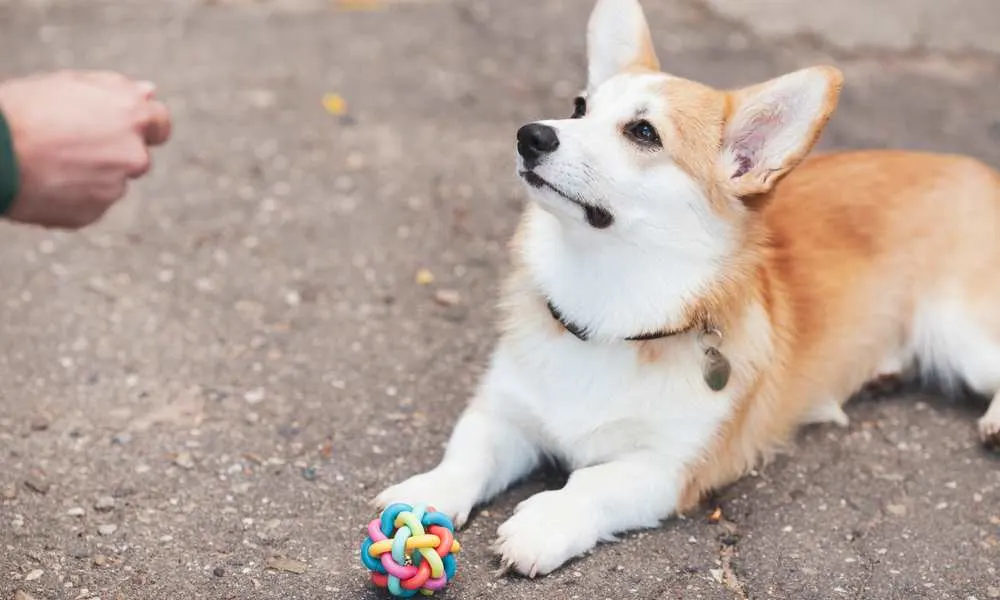Corgis are famous for many reasons across the world. They are lovable little creatures; short legs, pointy ears, and lushes coats. You know the deal.
But our little friends have another reputation that may not be talked about so much. They are LOUD. Don’t get us wrong; they’re still small dogs, so the Corgi bark won’t wake up the whole neighborhood. Waking up your entire family, on the other hand, is pretty much their specialty.
So if the furry rascal has just woken you up, you need to know a couple of things. First and foremost – what is up with all that barking in Corgis? And for heaven’s sake, why does my corgi bark so much?
Well, don’t worry, we’ll get to the bottom of this. But to do so, we must go over a couple of things. Why dogs bark in general is a good starting point – but we will go even deeper than that. The Corgi has a rich history that comes with that annoying bark, and it helps to know about it.
After all, it’s not barking just to bark. Dogs just don’t do that – they are trying to tell you something. Imagine a random person loudly telling you something you know nothing about. So let’s introduce you to your Corgi! You may not speak the same language – but it doesn’t mean that you can’t understand each other.
We know that it seems like losing your mind is inevitable, but keep calm. Read this article, and all that noise will be turned into a pleasant conversation about an invisible intruder that your Corgis are sure is in the house somewhere.

What’s Up With All The Barking In Corgis?
Why do Corgis bark so much? A simple question with a complicated answer. Well, there are simple answers:
- Your Corgi thinks that there’s a potential danger around.
- They’re trying to show dominance around other dogs and people.
- They’re trying to draw your attention to something.
- They want attention.
Well, there you go! But that doesn’t help much, does it? The longer answer is that you need to figure out the context of the barking. That isn’t to say that you need to learn what each and every bark sounds like, but understanding the situation that your dog found itself in is important.

Why Does My Corgi Bark At Other Dogs?
Barking at other dogs can mean a couple of things. Your Corgi could be excited, scared, or protective. The best way to figure out which case you have on your hands is, you guessed it – listening!

Low Pitch Versus High Pitch Barking
Did you ever hear how when people get excited, their voice starts hitting higher pitches and registers? Well, dogs are no different! When excited, your dog will have a high-pitched but not so frequent bark.
For example – when your dog is at the park running around chasing other dogs, there’s bound to be barking involved. Hey, kids yell like crazy when they’re playing around. Why shouldn’t your Corgi do the same?
New owners tend to get scared in these situations since they can’t figure out if their dog is scared, angry, or happy. Well, if your dog is barking in a high pitched tone while chasing or benign chased – he’s happy! The regular middle pitch tone needs a bit more investigation, but we’ll get to that in a moment.
Dogs tend to have a low pitched bark when angry or protective. The frequency of pauses in between the barks is also essential. If your dog is trying to warn you about something, it will raise its voice, so to speak.
Well, if that something is not that important or far away – there will be barking with long pauses between each bark. When they get more excited – those pauses get shorter. When they start losing their mind about something, those pauses pretty much disappear.
This kind of aggressive and loud barking is reserved for whatever they consider being a serious threat. A low-pitched and constant bak means that your dog is scared or angry and trying to either protect or attack you.

Body Language
So, high pitched means happy and excited; low pitch means serious and angry. But there is another way of differentiating between moods. Body language!
Your Corgis stance, tail, and ear locations can tell you all you need to know about why he is barking. If your Corgi is standing up, ears pointed up, and with its tail stiffened and pointed straight – it means that he’s not happy about something. And he’s ready to make a move to deal with whatever that is.
In this situation, the bark can tell you all you need to know. Corgis will have this stance when meeting new people or dogs. If the next thing you see is their tale waging – they were just cousins.
Tail between the legs is a definite sign that your puppy doesn’t like something. They are trying to protect themselves, and if they start barking in a low register – you better watch yourself!
Generally, though, a bark is a warning. So always be sure to figure out what they’re trying to tell you.
If you’re in your house or apartment, make sure that you figure out what’s making them bark by checking the tone and body language. Calm them down and show them that there is no threat present. If a Corgi is barking like crazy at new people coming in the house – it’s either overly excited or scared.
The excitement wears off; just make sure that your guest is okay with your Corgi jumping all over them. But if it’s fear, you need to teach your puppy that there is nothing to worry about. If that sort of behavior continues, you’re risking the chance of your dog developing some anxiety problems.

Are Corgis Loud?
You may have noticed that your Corgi is pretty darn loud for its size. Well, there is a reason behind this.
The Corgi was a working dog for a long time. They were used as shepherds for thousands of years. Besides that, they were great guard dogs because of their loud bark. In combination with a great sense of hearing, that loud bark means that the Corgi is one great alarm and security system.
They could hear an intruder coming in from far away, and they would wake up the whole village if necessary. And that ability never went away. They have the need to warn you about possible dangers, and they will act on it.
You just have to accept that it’s in their genes. They are doing their best to try and protect their family, just like they’ve been doing for thousands of years. So there has to be a period of adjustment – but they’ll figure it out, don’t worry.

Do Corgis Bark At Night?
Understandably, this is a concern for many people. If you have a dog that has been trained to protect a whole village by barking – it probably popped in your head that there could be some street noises during the night. Sure, a tired Corgi can sleep like a log after a long day, but the genes we mentioned are pretty darn strong!
If your Corgi hears something that could be a threat, he’ll wake you up. Don’t worry, though, if you just got him settled in a new environment – chances are it just needs to get used to some sounds. There will always be something that those pointy ears pick up, but after a while, they figure out what sounds mean what.
You mustn’t come running every time that they bark. You probably don’t want to wake your neighbors; we get it. But by coming to them, you’re essentially telling them they did a good job. Even if you’re angry, there’s a chance that they’ll think you’re mad at whatever they were barking at – so thank god that they did!

Are Corgis Yappers?
When you do some Corgi research online, you’ll find people asking questions like do corgis yap, or are Corgis yappers? This is actually a more common concern than people think.
So what does it mean when you ask a question like “Are Corgis Yappy?”. Well, to be a yapper is to talk a whole lot. And in that case – they can be!
This all depends on the owner much more than the dog. Your Corgi will mimic your behavior. This means that if you’re a yapper, your Corgi will be one too! You have to remember that you are its family now; they learn from you just like a child would.
But what does it mean when a dog talks too much. Well, it means that it’s going to vocalize its need as much as its abilities allow it. Which is cute and funny – but can get annoying.

Are Corgis Annoying?
This question can anger some people, and we get it. How dare we call you cute little Corgi annoying! But if you’ve been following along so far, we’ve described a dog that barks all day and all night because he’s trying to protect the village. It sounds pretty annoying; let’s face facts.
But all this depends on you. Sure, some dogs are prone to being louder or quieter; but it’s all up to you. If you teach your dog that he can be loud inside the house, it will be loud. If you reward it for being quiet – you’ll have a quiet dog. It is as simple as that.
All dogs function best when they’re rewarded for some behavior. You decide what behavior is good or bad.
So are Corgis quiet? No, mostly not – but they can learn to be!
Are Corgis noisy? Yes, but again – it’s up to you. You just have to stay persistent with what you are trying to achieve.

Why Do Dogs Bark?
When do corgis start barking? Is barking really a kind of language for dogs, or are they just yelling at things when they feel like they should?
We are proud to say that barking is a language – to be more precise; it’s one part of their language. See, dogs communicate with more than just sound. Body language and smell are just as important for them as vocalizing is for us.
Now, there are a couple of reasons for your dog to bark. We covered things like fear, excitement, and protecting its family. But there is one more reason that we need to mention. Boredom!
This can be a crucial doctor in how much your dog barks during the day. Dogs are social animals, just like us. They don’t like being alone all day – and who can blame them!
So if you came home from work and find an angry neighbor outside of your apartment, you can be pretty darn sure that your Corgi has been lonely and bored.
We suggest giving your Corgi a fair amount of exercise and playing time, or as much as you can, before leaving. As loud as a Corgi can get, if you tire it out enough – you don’t have to worry about noise and barking while you’re out.

Are Corgis Mouthy?
Remember how we said Corgis are famous shepherds and guard dogs? We weren’t kidding.
Sure, they are cute and small. But those little legs are there for a reason. The short stature allowed them to bite cattle at the heels. That way, they could keep them in line. You can imagine then that we are not talking about a weak jaw here.
The Corgi’s no alligator, let’s get that straight. But that little mouth is no joke!

When Should You Be Worried?
We talked about how to recognize what your Corgi is trying to tell you when it’s barking. But when should you be worried? Is too much barking a problem? Well, it can be.
If your dog is barking out of fear and aggression at other dogs or people, then you could have a problem on your hands.
In this case, there is a chance that your dog is suffering from an anxiety problem that is making it worried about everything and anything it encounters.

Canine Anxiety
Anxiety can be a serious problem for your puppy. When suffering from stress or anxiety, your dog has a difficult time figuring out what it’s feeling. It pretty much goes on an emotional rollercoaster every time it’s in a situation that’s different from what a typical day would look like.
The most common type of anxiety is Separation Anxiety. This usually happens as a result of switching families. Dogs get very attached to their owners, so it’s quite difficult for them to feel safe once they’re in a new home.
They’ll look fine, heck you’ll probably think that they’re the happiest they’ve ever been. But as soon as you leave the house – the barking tarts.
Separation Anxiety
We just have to mention separation anxiety since there is a good chance that there will be an abnormal amount of barking every time you leave. This is because the dog has suffered a type of trauma once his previous family abandoned him. We know that that might be a dramatic word, but it’s been abandoned as far as it’s concerned.
You can understand then that it worries that when you leave, there’s a chance that you’re not returning. So what’s the best way to make you stay – well, barking of course!
The best way to deal with this is just to leave, as cruel as it may sound. Coming back means you’re rewarding all the noise, so that’s not a good idea. You know that you’re coming back, and after a couple of times, your Corgi will figure it out as well.
Fear Induced Anxiety
Having a fearful dog is more concerning than you might think. First of all, it sure is not fun for your dog to be scared all the time. Second of all, your dog’s fear can quickly turn into aggression. And once it does, you could be in a world of trouble.
Dogs that suffer from fear-induced anxiety can have a lot of problems socializing with other dogs. And dogs are, just like us, social creatures. Once you take that away – you get a dog that can develop other problems.
But what does this all have to do with barking? Well, a lot. If your puppy is scared and anxious all the time, it will express it vocally. Because of this, it is imperative that you know what the symptoms look like. If you notice that your dog could be struggling with any of this, you need to help it deal with it all.
If you don’t, you risk your dog becoming overly aggressive not only with other dogs but with other people as well. Fearful dogs get attached to their owners and then protect them far too much. Aggression is something that should be nipped in the bud. But if you don’t know what caused it – you won’t know how to stop it.
It’s crucial to know what kinds of barking there are and which one means what. Your dog could be building up its aggression without you noticing.

Are Corgis Known For Barking?
So if the Corgi is a famous guard dog that warns people by barking – how can you know when to get worried? Well, it’s simple. We already gave you a useful guide by which to differentiate types of barking.
Any time that your dog is excited – be happy for him! If your Corgi gets overly excited – you’re allowed a low level of worrying.
If your Corgi is scared – make sure to find the source of fear and deal with it. Fear is sometimes justified; what isn’t is not dealing with it. If there is a good reason for your dog to be scared, then make sure to get rid of that reason as soon as possible.

Will Corgis Bark At Anything?
It may seem like we’re exaggerating, but yes, Corgis will bark at anything. By nature, they are vocal dogs, and they don’t mind showing it. This can be cute if you have a yard and the neighbors are not close by. But if you are in an apartment, it can be a problem.
Suppose you don’t suspect that your Corgi is having some issues with stress or anxiety., then it’s just a matter of training. It may seem impossible at first, but with persistence, you can pretty much teach your dog anything.

How To Stop Corgi Barking?
There are a couple of ways to quiet down a Corgi. Well, you’ll never have a quiet Corgi, but you can do your best and stop unnecessary barking.
Rewarding good behavior is by far the best way to go about it. But it’s a bit more complicated than giving your dog a treat every time he’s not barking. You need to make sure that your Corgi understands what he’s getting a reward for.
This is all to say that sometimes even the owners need a little training. You may be rewarding your puppy for barking without even realising it. When that happens, the barking will just get more and more frequent – and it will annoy you more and more.
The best rule of thumb for any kind of training is that you don’t give the award the second your puppy does something right. Let’s say, for example, that your dog is barking like crazy while inside. You can’t give it an award the second he stops because it’s going to think that you’re rewarding the barking.
What you should is the following:
When you tell your Corgi to stop barking, wait till its focus is switched to you. Once this happens, you should use a cheerful voice to signal that it did something right, and then if its focus isn’t momentarily lost – give the award.
This is the way to make sure that it knows exactly what the reward is for. It’s quite simple, but because it’s so simple, people tend to rush it. And remember – it will take some time. Corgis are loud by nature, but every dog is unique. Yours could learn to stay quiet in a couple of days, while somebody else’s puppy takes much longer.

Are Corgis Vocal?
If you’re having trouble teaching your pup that it should stay quiet in certain situations, you might be wondering – are Corgis vocal? Or, to put it another way, are Corgis barkers?
All dogs are barkers, obviously. Corgis are no different. They tend to bark more than some other breeds, so we guess you can say that they’re an above-average barker. But there is no science-based list that would rank breeds on this basis.

Final Words
Let’s sum this up.
Do Corgis bark a lot? Yes, they absolutely do. But with proper training and patience – they can learn not to be.
The Corgi has its flaws, but there is a rather great upside. The love that they will give you can’t be measured. And it outweighs all that noise and frustration!
After all, most of that annoying barking is there for your own good. Well, as far as your Corgi is concerned. He’s just trying to protect the family! Well, that and it’s bored. Either way, they’re still our favorite little creatures. No amount of barking will ever change that.
Read Also: Why Do Corgis Make Weird Noises?

